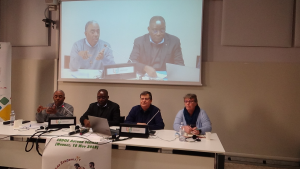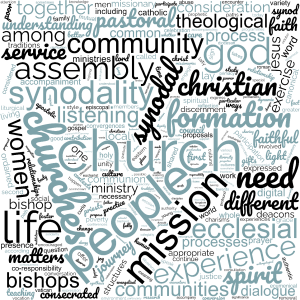As the 16th assembly of the Synod of Bishops unfolded, the imagery of “seed” grew and multiplied. There was an awareness that we were beginning something, nurturing a seed already planted in the Church through the two years that preceded the assembly, where people came to understand a new way of doing things, a new manner of proceeding, that called all to transformation.
Like the many “seed” parables of the Gospels, this seed has been at times unseen, growing of its own accord, ancient yet new, emerging among us …
But Synod documents can be dense, long and at times frustrating to get to the point. As a result, I chose to put the whole document into a Word Cloud and focus on the key ideas that emerged to challenge us and move us, the whole Church, forward.
Church
First and foremost, this is a call to build the Church, “repair my house.” As religious, we are called to be at the heart of the Church as it comes to understand this new, yet quite ancient, way of proceeding. Although the word, synodality” is a puzzle to many. It is more effectively translated as how we walk together, with the Lord, into the future. How do we take up that Emmaus journey where we talk, we deeply listen, we reflect and we find what really makes our hearts burn?
We are called to be witnesses to a process that has always been held with reverence, as discernment, within the lives of our communities, and chapters. Not only that, we are challenged to call forth the gifts of others, of all the baptized, in this way of acting, being and serving. Many in the synod drew on the example of small or basic Christian communities as a seed of this idea and of this way of functioning.

This is not some vague, broad theological idea but a deeply practical, functional reality. This is a clear experiential act – to be among, to be with, to be for the people of God in their conversion. The various debates about history, purpose, and some of the random topics that were seen as “hot-button” issues were not at the center of the synod. Far more, from my experience, it was about how to be Church, how to enter into dialogue, how to listen, how to move forward TOGETHER, how to find consensus in the midst of division, how to be faithful to the Lord who constantly calls us forward.
Formation
A word that emerged in conversation and interventions on every topic and at every level was formation. This way of processing, of understanding, is ancient in the Church but has to be learned through experience. We only have to look in the Acts of the Apostles, at the first council of Jerusalem, to see how it faced these first puzzles of the early Church, discussing, listening, hearing each other, and in prayer, seeking a way forward, through consensus.
So how do we form the people of God in their baptismal dignity? In their role in the Church not as passive recipients but as active partners? How do we nurture, promote and form the skills of persons to take up roles in the Church that we may have never thought of before, like the digital world? How do we form those within the Church, at every level? How do we develop an openness to this way of proceeding? How do we form all for mission?
Before the synod, reading through the continental reports, one assembly noted that the participants in that assembly neither understood nor had really experienced the process of “conversation in the spirit”, the process of discernment that has formed part of the synodal way. They went back to the drawing board, to formation, to learn, experience and live that process and then, with tottering steps, apply it to their deliberations.
Discernment cannot be assumed. A process must be learned and there are many traditions and ways forward but all call us to intentional and deep listening to the other, to finding consensus in the process.
Process
The process used within the synod is one among many but it brings the Spirit into the conversation, makes space for the movement of our hearts and minds, and seeks the “magis”, the more of God for all. And that is crucial. It is not about making a functional decision alone but about finding the best way forward, listening to all, considering all, and considering the movement of our hearts, as to where the Lord is calling us today.
One intervention put it this way, but it can be hard to translate as it is a play on words in English, but it is the difference between decision-making and those responsible for decision-taking. The Church is not a democracy, and there are many facets to every issues – between Tradition, theology, canon law and practical realities. And, rather than a parliamentary act, with a vote, it is about the best decision in that moment, through prayer and reflection, considering all that has been said, heard, taken to heart and lived.

The synodal way calls all to participate in the decision-making process: dialogue, listening, inclusion, respect, openness, honesty … and with all that before us, discern a way or ways forward.
The challenge is for all small groups, parish and diocesan bodies, old, already established and new, to live out this paradigm. The synod refers to its own historical tradition – that it has only been less than 200 years since synods included a wide variety of people. How do we enable this process to emerge again at every level of the Church?
I believe that we as religious can participate in this unfolding process by being guides, as support, as those who accompany people through the process. The synod itself learned of the value of having facilitators not embedded in the decision but focused on helping the process unfold, whatever the final consensus might become. Facilitators are not another group to dominate the process, but to free it from the shackles of its variously limiting factors, and awaken anew the seed that lies within. It is not rocket science to have experienced vibrant alive and active parishes where all contribute, all participate in process of dialogue, and decisions are made transparently by leadership in light of it all. The call of the synod is to widen, deepen, and expand that experience through more experience.
So, what does it challenge us to do:
– To live this model of discernment faithfully, transparently, openly;
– To accompany the processes in a positive, supportive and affirming manner;
– To help develop a consensus-oriented discernment process.
A synod example …. When my group was examining the final document, within my group about half had a great deal of issue with the term, LGBTQ+. As we shared, listened, and discussed, it became clear it was not about the issues of sexual identity, but about how the term was perceived as a political, ideological issue in some parts of the world. It triggered an emotional and not always a rational response, which we all came to understand. Many felt that sexual identity was an important puzzle before the Church so in that final text we proposed using sexual identity rather than the politically charged term … all could accept to move forward with this issue and its various realities in their parts of the world.
Mission
A clear orientation of the synod was that the Church is for one thing, for mission, to proclaim Jesus Christ. Its internal structures and processes were to be oriented outward, not inward, to all, to the world, to the transformation of all into the Kingdom.
So, the first challenge is to facilitate the necessary encounter with the person of Jesus – liturgy, prayer, Eucharist, and many other elements, online and in person, were all discussed.
Then having experienced the wonder of the love of God, we are drawn to reach out, to love, to share our lived experience and the love of God with others in a multitude of ways.
That call to mission is for each and every person and there, again, we have a role – to accompany the Church, drawing from our experience and knowledge, to develop experiences of service within the Church and in service of our neighbor. It is possible at every level but it takes time, planning and experience as well as an attitude of listening, dialogue and discernment to find those ways most needed in every time and place.
An opportunity
So, the synod and its continuing unfolding provide an opportunity for religious to bring from our storehouse, things old and new, experiences and actions that have been part of our lives and once again, faithfully, bring them to the Church and to the world.
This synod is a beginning, a first step.
– It calls for processes of discernment to be developed and implemented across the Church.
- It calls for the baptismal dignity of all to be honored, nurtured and valued.
- – It calls each and every person of faith to be formed to mission, to action, to respond to the love of God.
The Church is honestly at all different points in this process … and we, as religious, are called to take up the challenge to scatter and nurture this seed, anew.
“Then every scribe who has been instructed in the kingdom of heaven is like the head of a household who brings from his storeroom both the new and the old.” Matt 13:52.

